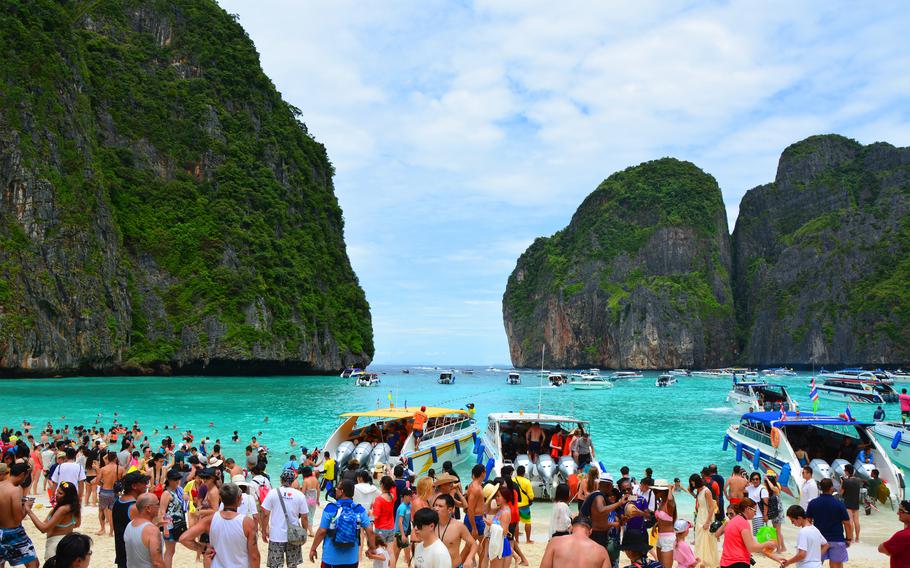
Maya Bay, a Thai beach made famous by the movie “The Beach,” will reopen in January after a more than three-year closure so the site and coral reef could recover from overuse. Above: Crowds flock to the sand and waters in 2015. (iStock)
Thailand's Maya Bay, a tropical paradise made famous by the 2000 film "The Beach," which starred Leonardo DiCaprio, is set to reopen next year following more than three years of closure, Thai officials announced, adding that the destination — which was ruined by overtourism — will welcome back visitors under new rules to protect the ecosystem.
With its white sand, lush green surroundings and crystal clear waters, the bay, which is located on Phi Phi Leh island in Krabi province, was flooded with tourists after the release of the film, which was based on a 1996 novel by Alex Garland.
By 2018, up to 5,000 people a day visited the destination — with many visitors leaving plastic waste behind, causing damage to the ecosystem.
While those who flocked to the bay expected to be met with the serenity and beauty depicted in the film, some were shocked to find the sandy strip strewn with litter and overrun with visitors. One tourist who visited the beach before it closed told the BBC that the bay was more like "New York's Times Square" than a secluded paradise.
In June that year, authorities announced the bay would close its doors to visitors for four month so the beach could recover. Authorities said fragile coral had been destroyed by swarms of people and that the hundreds of tourist-packed boats pulling into the waters were leaking oil and disturbing marine life.
The damage was so serious that authorities decided in 2019 that the bay needed more time to heal — and announced it would be closed for two more years — to the disappointment of tourists and local tour operators who profited from the sandy cove.
Following the bay's closure, blacktip reef sharks were spotted and new coral began to grow — signs of hope that the beach could heal from the damage inflicted by widespread human interest.
In a statement issued Nov. 14, Natural Resources and Environment Minister Varawut Silpa-Archa said that the bay was now in a good condition, and officials said the reopening is expected to take place Jan. 1.
Officials said the number of visitors to the beach would be closely monitored with only up to 300 people allowed at a time. Trips will be capped at one hour, and designated areas for water sports will be introduced.
Tourists may only visit between 10 a.m. and 4 p.m. and will be driven to a newly installed pier erected at the back of the island — away from the famous cove.
Boats are no longer allowed to enter the bay — another move officials hope will protect the site's delicate coral reefs.
Thailand began reopening its doors to visitors from more than 60 approved countries in November after months of closure amid the global health crisis. Some protected sites require guests to present a "COVID pass," according to the official website of Thai National Parks.
Following the coronavirus pandemic that brought much of global travel to a halt, experts have urged those desperate to book a vacation as restrictions lift to rethink their bucket list, so that top attractions are not overwhelmed with visitors once again.
Popular destinations in countries across the world have long faced the problem of overtourism — forcing tourism boards from Italy to Iceland and Croatia to The Netherlands to increase protection methods.